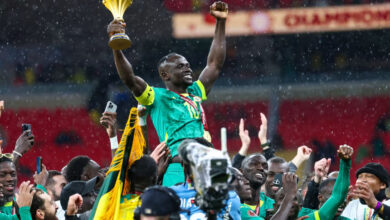Contrasting reactions have arisen to Qatar's winning the bid for the FIFA World Cup 2022.
Some say that the wealthy and tiny gulf emirate doesn't deserve to host international football’s biggest tournament, arguing that its conservative culture will be an obstacle to the event’s success.
Others say that Doha has managed to benefit the whole Arab World as its ambitious ruling elite make the most of its multicultural and modern society.
On Thursday FIFA's executive committee chose Qatar over the US, Australia, Japan and South Korea in a secret vote, making it the first country in the Middle East to receive the honor of hosting the world’s biggest football contest.
Several Arab countries such as Egypt, Libya, Morocco and Tunisia have competed to host the FIFA World Cup bid in previous years, but all failed.
Qatar’s win inflames bad memories for the most populous country in the region.
In one of its most flawed international appearances, Egypt’s bid for the FIFA World Cup 2010–designated to be held in an African country–failed to garner a single vote from the 24 members of FIFA’s Executive Committee.
Egypt's “zero vote” has become a common phrase in addressing the failure of President Hosni Mubabrak’s ruling National Democratic Party (NDP) to maintain Egypt’s political and cultural weight in the international arena.
Pan-Arab newspapers, which regularly express anti-Mubarak sentiments because of his close relationship with the United States and Israel, praised the Qatari achievement.
Algerian Echorouk wrote in the headline of its Friday's issue "Qatar defeated America", before going on to stress the failure of Mubarak's Egypt to a achieve a similar victory.
"Qatar is a pioneer… Qataris have learned lessons from other Arab representatives… They [Qataris] prefer to work harder instead of showing over-confidence. Moreover, they did not rudely say that their country is the greatest in the Arab World," wrote the Algerian daily, referring to Egypt’s nickname in the Arab media.
London-based Al-Quds Al-Arabi chose to stress the benefits for the Arab World of the Qatar's victory, saying in its editorial that "this country, small in it size but big in its dreams, deserves to be congratulated for a huge and unprecedented achievement.”
Following the announcement, the Qatari Emir Hamad bin Khalifa vowed on Thursday that Qatar will host a tournament that honors all Arabs.
However, Egyptian journalist and blogger Mohamed Gamal dismissed the idea.
"Qatar totally rejected using the adjective Arab in either their file or their campaign for the World Cup bid. They stressed all the time that they are Middle Eastern: a clear message for Israelis that they are not excluded in the Qatari bid," said Gamal.
In its advertising campaign, Qatar’s executive committee for the 2022 World Cup bid included an Israeli child speaking about his wish to see the Israeli team playing with Arab teams in Doha.
"They [Arab and Israelis] would get to know each other,” said the Israeli child in the video.
Israelis are banned from entering the majority of Arab states, but Qatari officials stressed that there will be no obstacles for Israelis entering Qatar.
"All nations participating in the FIFA World Cup are welcome," Hassan Abdulla Al-Thawadi, the chief executive of Qatar's 2022 World Cup bid, responded to a question about whether Israel would be welcomed if it qualified.
"I have been following countries’ bids for hosting the FIFA World Cup, and there was no country that continually stressed its good intentions towards Tel Aviv except Qatar," said Gamal, who added that "Israel is not such an important factor in the World Cup bid."
Moreover, concerns were raised about the social and religious conservatism in a country that has a size of less than 12,000 sq km.
Some observers questioned the ability of Doha to host a sports event always marked by cultural complexities and differences in a country that is widely seen to be dominated by conservative social and cultural norms.
The Qatari campaign included videos showing a rich nightlife in the country, a claim disputed by those concerned about the society’s conservative nature.
A Western football fan asked in Twitter, "what's the nightlife like in Qatar?” and he replied, “Sorry fans but other [than] the two hours of football a day, you guys will be stuck in your hotel rooms".
On Thursday, Katar, Quatar and Qatar (different spellings for the country’s name) shot to the top of Twitter trends.
"But Qatar? Qatar is a nation of fewer than 1.5 million. Assuming half of these are female, and that Islamic law will prevail during the World Cup, that means local spectator numbers of considerably less than 1 million," stated an article at the Sydney Morning Herald.
"Qatar is an alcohol-free nation. The head of the bid delegation said Qatar would permit consumption of alcohol during the tournament, in specific fan zones. Is this some new form of apartheid? Where does FIFA sit on human rights of host nations?” asked the Australian paper.
Sayed Mahmoud, an Egyptian literary critic, dismissed these cultural dimensions.
"All the talk about conservative Qatar is misleading," said Mahmoud. "In a rich country like Qatar, conflicting norms are not going to be tackled in a violent way. Issues like drinking alcohol or having a wild nightlife will be settled through political decision-making."
According to Mahmoud, "the ruling family and people of Qatar are fully aware that hosting the World Cup would bring home a diverse range of cultural and customs and I'm sure they are well prepared and ready for receiving such diversity."
In the wealthy, oil and gas exporting country around three-fourths of the population of 1.5 million are expatriate migrant workers from Asian, Arab and European countries.
Mahmoud argued that "previously, the presence of migrant workers, specifically from Asia, wasn’t used as a tool to market Qatar because of a negative and sometimes racist attitude towards those workers. Now, however, Qatar is sending positive messages to the whole world that those peoples are becoming an asset for multicultural Qatar."
"What we are observing now is the idea of diversity and multiculturalism being threatened in countries such as Egypt, Iraq and Lebanon. At the same time the Gulf is becoming the new spot for diversity and multiculturalism."
Emir of Qatar Hamad bin Khalifa seized power in 1995 after deposing his father, and since then the country has undergone massive transformations internally and externally.
One year later, bin Khalifa issued a decree to establish Al Jazeera channel. This has significantly raised Doha's media profile.
"Westerners don't know where Qatar is on the map but they do know Al Jazeera," said Mahmoud, referring to the declining effect of Cairo's soft power in comparison to influence exercised by Doha.
"Cairo also resents having to deal with tiny Qatar, whose influence has grown since Al Jazeera was established… Qatar acts as a mediator all over the place, from Yemen to Lebanon and Sudan. In Nasser’s day the Sawt Al Arab (Voice of the Arab People) radio station made Egypt the sounding board for the Arab World; since then its continued insistence on promoting Egypt as the heart of regional politics has made its radio and television productions unmarketable, and Egypt now has no comparable foreign news service," wrote Sophie Pommier in the December issue of Le Monde Diplomatique.
Last year Mubarak boycotted the Arab Summit in Doha, which was aimed at bridging gaps in opinion among Arab countries after the Israeli aggression on the Gaza Strip, during which more than 1,300 Palestinians were killed.
Egypt's state-owned newspapers launched a severe attack on Qatar and its Emir.
However, nearly ten days ago Mubarak paid a visit to Doha that ended longstanding bilateral and regional differences between the two countries–on issues such as Palestine, Israel and Darfur–according to Egyptian diplomatic sources.
Sources said that in light of this visit, Egypt–a member of FIFA's Executive Committee that selected the World Cup host for 2022–would give its vote to Qatar.




